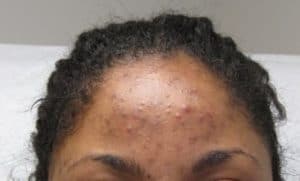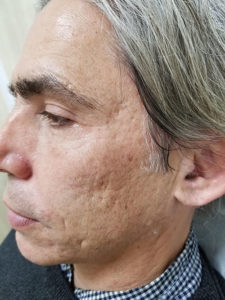When it comes to acne treatment sometimes you don’t know what you don’t know.

Introduction
With so many options to address the problem of zits and pimples some might ask if a dermatologist for acne treatment is necessary. Over-the-counter treatments can, in fact, work for mild acne. Sometimes even spa treatments help. There are things to know about acne, however, to understand why you might need to see a specialist and what a board-certified dermatologist can do for you that others cannot.
The problem with self-diagnosis and why you may need a dermatologist to treat acne
- Your self diagnosis may be wrong: Not all bumps on the face are acne vulgaris, the condition we refer to as acne. In fact there are many types of acne. The wrong diagnosis usually leads to the wrong treatment. The wrong treatment may not help the condition and may cause other problems.
- You may not understand how to choose the right strategy: Sometimes even mild acne causes other problems such as hyperpigmentation. Dark marks and blemishes may be more dramatic than the underlying acne. Some people don’t even realized that the acne is present. They get frustrated trying to treat dark marks that keep appearing for an unknown reason. They don’t understand that the solution is to treat the acne.
- The acne may be too severe for at home treatment: read on the learn more.
- You may have other skin problems: People with acne can have other skin problems, such as seborrheic dermatitis or eczema, that can get worse when they use certain products or medications—even the over-the-counter ones. You may need an expert to help you understand and manage how the different conditions and medications interact.
How dermatologists treat acne
Board-certified dermatologists are physicians that have the highest level of training in the treatment of skin disease. This allows them to offer the most personalized and comprehensive care to acne patients. Here is what they can offer:
- Recommendations on diet, lifestyle, and skin care products– this is not unique to estheticians
- Evaluation of acne in the context of other health problems such a polycystic ovarian syndrome
- Option to also use prescriptions medication. Dermatologists have access to some medications that other doctors generally do not. Medications may be what is needed to prevent scarring. Medications can be topical creams and gels or pills.
- Procedures to treat and prevent acne, hyperpigmentation from acne, as well as acne scars, including those that should only be done by a licensed, health professional. These include injections, chemical peels, laser treatment, rf microneedling, extractions and more.
Dermatologists can offer more options for acne treatment than other professionals
- Estheticians: Estheticians are licensed beauty professionals that can offer some helpful advice and services for addressing acne. They can only offer cosmetic services. As they are not health professionals they cannot prescribe medication or offer certain procedures. Estheticians can offer extractions, facials, lifestyle advice and skin care products recommendations. Many times, however, a person needs something an esthetician is not licensed to provide.
- Non-dermatologist doctors, and “providers”: Although general doctors, and physician extenders are able to prescribe most acne medications, they may not have the accredited training, experience or expertise to offer the level of treatment you may need. A board-certified dermatologist has the most training, the most expertise and can offer the largest range of options.
Complex acne issues
Severe acne – risk of scarring
As acne is such a common problem that is often mild, many people don’t appreciate that it can be severe. With severe acne one is at risk of developing permanent, disfiguring scars. The inflammation from the disease can cause destruction of tissue leaving depressed areas or holes in the skin which are called atrophic acne scars. If a person has an aggressive scarring response, however, acne can cause keloid-type scars. Preventing scarring from severe acne requires early intervention. It also often requires the use of more powerful medications and procedures available from a dermatologist.

Treating acne while pregnant and breastfeeding
The hormonal changes of pregnancy can make acne better or worse. One may choose not to treat acne at all during this time. If one chooses to treat be aware that not all treatments are safe to use during this period of a woman’s life–even some of those available over-the-counter. A dermatologist has the knowledge and access to treatment that can be used safely during pregnancy and lactation.
Hormonal acne
Hormonal acne tends to flare on the jawline and chin during certain times of a woman’s menstrual cycle. It is a common type of adult female acne but may also be one of many findings in people with polycystic ovarian syndrome. Hormonal acne may require targeted hormonal treatment. A dermatologist has the expertise and skills to evaluate and manage this type of acne and offer helpful alternatives such as spironolactone.
Isotretinoin
Isotretinoin, commonly known by the original brand, Accutane, can be thought of as the “big gun” of acne treatment. Accutane can potentially cure acne in some people–but it is not for everyone. Although perhaps the most effective drug in dermatology, isotretinoin is a medication with serious potential side effects, including birth defects. Access to isotretinoin is highly regulated by the ipledge program. Treatment requires a commitment of several months of therapy, a willingness to get regular blood testing done, and for women of childbearing age the use of certain contraceptives or a commitment to remain sexually abstinent during treatment if you have sex with men. Not all doctors are certified to write for isotretinoin. Most dermatologists are.
Other considerations
How much does it cost to see a dermatologist for acne?
When some people consider going to the dermatologist for acne, they assume that that option is going to be more expensive. This is not true. Sometimes getting help from an expert is less expensive. Acne treatment, including some of the procedures people pay cash for at spas, are often covered under most health insurance plans. People without health insurance just need to ask what the cash price is to see the dermatologist—it’s often less than they expected.

Even if going to the dermatologist seems more expensive than buying skin care or getting help from others, it may ultimately be cheaper. It may prevent you from buying the wrong products. It may prevent you from paying for ineffective treatments and developing complications that may later require expensive care such as scarring. Seeing the dermatologist is an investment in getting the best advice to treat acne and prevent complications. There may be seemingly cheaper options, but as the saying goes, “sometimes being cheap is very expensive.”
Virtual dermatologist- works well for acne
With the pandemic, the shortage of dermatologists in the United States, and a preference for convenience, many people are exploring getting care online. Acne can be a great condition to treat virtually as it mostly appears on the face. Note that with online visits only evaluation and medical management, not procedures, are done. It’s important, however, to know that the credentials of the person treating you whether they be online line or in person. Good virtual care requires more expertise—not less.
Conclusion
Needing to treat acne may be common. This doesn’t mean you can do-it-yourself or that a five-year old can do it. Getting rid of zits fast may sometimes be as simple as reducing sugar in your diet. Getting rid of cystic acne overnight may require a specialist. Early treatment prevents permanent scars. Acne can be a sign of other medical conditions that need the attention of a doctor. There is no magic bullet for acne treatment. You may to see an expert to get the best results. Dermatologists are the acne specialists. Do dermatologists actually help with acne? Yes we do.
Visit our acne page for more information
If you’d like to schedule a virtual or in-person consultation for acne treatment call 212-627-1004 or here.


